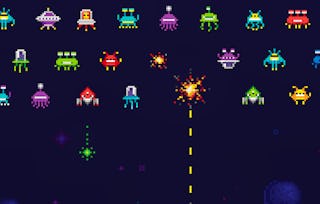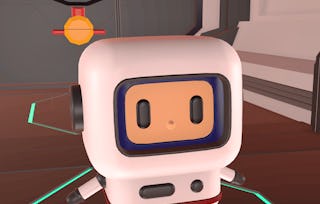If you love games and want to learn how to make them, then this course is your third step down that path. In this course you will learn the fundamentals of game design, including an understanding of level design, game balancing, prototyping, and playtesting, as well as game asset creation techniques. You will continue developing video games using industry standard game development tools, including the Unity game engine. At the end of the course you will have completed a 3D First-Person Shooter game, and will be able to leverage an array of game development techniques to create your own basic games.

Game Design and Development 3: 3D Shooter

Game Design and Development 3: 3D Shooter
This course is part of Game Design and Development with Unity Specialization

Instructor: Brian Winn
8,796 already enrolled
Included with
66 reviews
Recommended experience
Skills you'll gain
Details to know

Add to your LinkedIn profile
7 assignments
See how employees at top companies are mastering in-demand skills

Build your subject-matter expertise
- Learn new concepts from industry experts
- Gain a foundational understanding of a subject or tool
- Develop job-relevant skills with hands-on projects
- Earn a shareable career certificate

There are 4 modules in this course
Are you ready to take the next step in your journey into game design and development? In this module, we will introduce the course and kick off your third game project, a 3D Shooter. In the first part of the assignment, follow along with the tutorial videos introduced in this module. In the second part of the project, you will modify the game to make it your own.
What's included
31 videos3 readings
A big part of game development is developing the game assets. Game assets in Unity include the visuals (2D and 3D graphics, fonts, materials, animations), audio (sound effects, voice acting, ambient sounds, and music), and even the game logic (C# scripts), amongst other things. In this module, we will explore concepts and creation techniques of graphics, concepts and creation techniques of audio, the asset pipeline, and explore programming best practices.
What's included
13 videos4 readings4 assignments
In this module, we will explore level design and game balancing. Level design is where the ‘rubber meets the road’. The level design is where the gameplay, storyline, art, and technology all come together to create the actual game world the player experiences. We have discussed the idea of creating experience goals, designing, playtesting, comparing the difference between the experience goals and the actual experience, and then iterating on the design, several times. This is game balancing. It is what iterative design is all about.
What's included
9 videos10 readings2 assignments
Prototyping is one of the most critical skills a game designer can cultivate. The ability to "find the fun" in gameplay design is critical to being a successful designer. In this module we will discuss prototyping of a game. This can then be put in front of players during a playtest, allowing you to better understand if the underlying mechanics, systems and aesthetic are something that players may find engaging. As you work on your 3D Shooter project, you should be playtesting. In this module, you will also finish up the 3D Shooter project, submit it for peer review, and peer review your fellow learners games. Finish the course strong!
What's included
8 videos1 reading1 assignment1 peer review
Earn a career certificate
Add this credential to your LinkedIn profile, resume, or CV. Share it on social media and in your performance review.
Instructor

Offered by
Explore more from Software Development

Michigan State University

Michigan State University

Michigan State University

Michigan State University
Why people choose Coursera for their career

Felipe M.

Jennifer J.

Larry W.

Chaitanya A.
Learner reviews
- 5 stars
81.81%
- 4 stars
13.63%
- 3 stars
3.03%
- 2 stars
1.51%
- 1 star
0%
Showing 3 of 66
Reviewed on Sep 5, 2021
I really like the theoretical parts of these courses

Open new doors with Coursera Plus
Unlimited access to 10,000+ world-class courses, hands-on projects, and job-ready certificate programs - all included in your subscription
Advance your career with an online degree
Earn a degree from world-class universities - 100% online
Join over 3,400 global companies that choose Coursera for Business
Upskill your employees to excel in the digital economy
Frequently asked questions
The course was originally built with Unity 5.1.x. However, we recently updated lessons to Unity 5.4.x where there were notable differences between 5.1 and 5.4.
To access the course materials, assignments and to earn a Certificate, you will need to purchase the Certificate experience when you enroll in a course. You can try a Free Trial instead, or apply for Financial Aid. The course may offer 'Full Course, No Certificate' instead. This option lets you see all course materials, submit required assessments, and get a final grade. This also means that you will not be able to purchase a Certificate experience.
When you enroll in the course, you get access to all of the courses in the Specialization, and you earn a certificate when you complete the work. Your electronic Certificate will be added to your Accomplishments page - from there, you can print your Certificate or add it to your LinkedIn profile.
More questions
Financial aid available,

